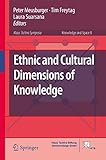Ethnic and cultural dimensions of knowledge / edited by Peter Meusburger, Tim Freytag, Laura Suarsana.
Tipo de material: TextoSeries Knowledge and Space, Klaus Tschira Symposia ; 8Editor: Cham : Springer International Publishing : Springer, 2016Edición: 1st ed. 2016Descripción: x, 304 páginas : 36 ilustraciones, 29 ilustraciones en colorTipo de contenido:
TextoSeries Knowledge and Space, Klaus Tschira Symposia ; 8Editor: Cham : Springer International Publishing : Springer, 2016Edición: 1st ed. 2016Descripción: x, 304 páginas : 36 ilustraciones, 29 ilustraciones en colorTipo de contenido: - texto
- computadora
- recurso en línea
- 9783319219004
- GF1-900
Springer eBooks
1. Cultural and Ethnic Dimensions of Knowledge: An Introduction -- 2. The School System as an Arena of Ethnic Conflicts -- 3. Race, Politics, and Geography in the Development of Public Schools in the Southern United States -- 4. Spatial Traditions of Knowledge and Education—Ethnic Groups in the United States Reconsidered -- 5. Educational Inequalities Reflecting Sociocultural and Geographical Embeddedness?—Exploring the Place of Hispanics and Hispanic Cultures in Higher Education and Research Institutions in New Mexico, the United States -- 6. Local Cultural Resource Knowledge, Identity, Representation, Schooling, and Education in Euro-Canadian Contexts -- 7. The Knowing in Indigenous Knowledge: Alternative Ways to View Development, Largely from a New Guinea Highlands’ Perspective -- 8. Local Knowledge as a Universal Social Product: A General Model and a Case from Southeast Asia -- 9. Local Knowledge and Global Concerns: Artificial Glaciers as a Focus of Environmental Knowledge and Development Interventions -- 10. Political Economy, Power, and the Erasure of Pastoralist Indigenous Knowledge in the Maghreb and Afghanistan -- 11.“Masawa—bogeokwa si tuta!”: Cultural and Cognitive Implications of the Trobriand Islanders’ Gradually Lossof Their Knowledge of How to Make a Masawa Canoe -- 12. Beyond Merry-Making: Customs of Indigenous Peoples and the Normative Functions of Ceremonies in Precolonial Igbo Societies -- 13 Knowledge, Behavior, and Culture: HIV/AIDS in Sub-Saharan Africa.
Para consulta fuera de la UANL se requiere clave de acceso remoto.


